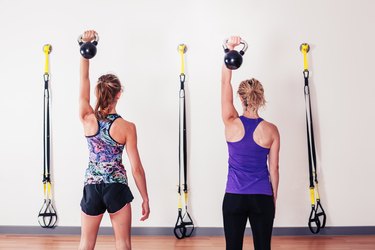
Shoulder presses are considered an effective exercise when it comes to improving shoulder strength and size. The shoulder press is a structural exercise, meaning it places stress on your spine because you maintain an erect position with your torso as you perform it. Incorrect form and other factors can cause back pain when you do shoulder presses.
Shoulder Press Benefits
Video of the Day
Shoulder presses primarily work your deltoid and triceps muscles. Shoulder presses secondarily work the trapezius, latissimus dorsi and rhomboid muscles in your upper back, as well as your erector spinae, or lower back, especially when you perform the shoulder presses standing. If you overdo it, you may suffer soreness in these areas in addition to the primary shoulder muscles this exercise works.
Video of the Day
Standing Shoulder Press
When you perform a standing shoulder press, technique is extremely important so you don't place undue strain on your spine, according to the American Council on Exercise. The common tendency is to arch your lower back as you lift the weight, which increases the load on your spine. To prevent arching your back, squeeze your gluteal and abdominal muscles as you lift and use a mirror to monitor your form. Also hold your barbell in front of you and press it overhead instead of starting and finishing the exercise with the bar behind your head. The standing shoulder press is considered an advanced exercise.
Seated Shoulder Press
Form also is important for reducing back pain risk when you perform a seated shoulder press. Always sit with your back supported against a backrest. Make sure your feet are placed firmly on the ground or on footrests. Also contract your abdominal muscles because this stabilizes your spine. Maintain your lower back's natural curve. Avoid pressing your lower back into the backrest or arching your lower back as you perform your shoulder presses.
Self Care
If you suffer mild back pain after performing shoulder presses, use self care including icing the sore area for 20 minutes at a time for two to three days, then applying heat in subsequent days for short time frames to promote blood flow and relax your muscles. If your pain does not get better within 72 hours, or if it is acute, consult a doctor. Anyone with back problems or a history of back injury should consult a healthcare provider before trying shoulder presses.